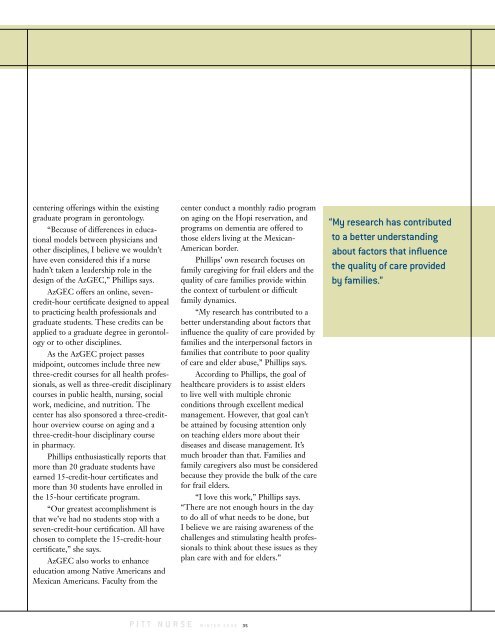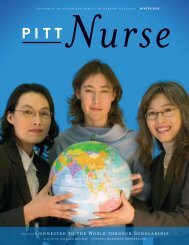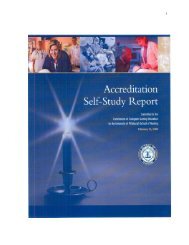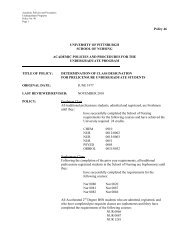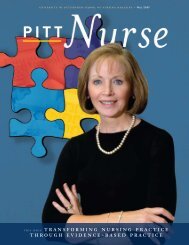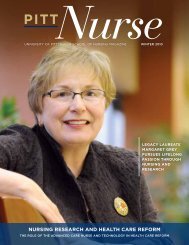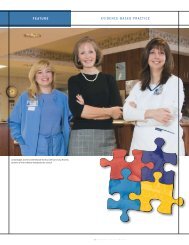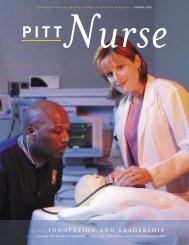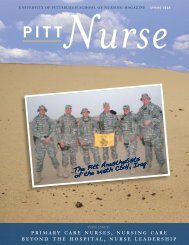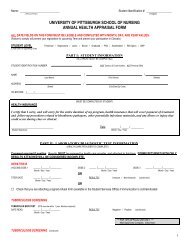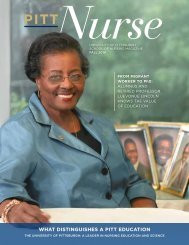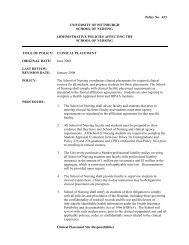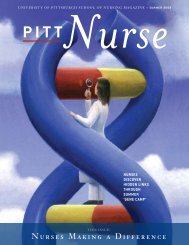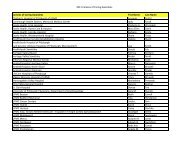A l u m n i P R O F I L EL i n d a R . P h i l l i p s, P h D, M N ’ 7 3 , B S N ’ 6 9, R N, FA A N, F G S AAlumna committed to improvinghealthcare for Arizona’s elderlyAccording to Phillips, the ideawas to focus strongly ondeveloping geriatric clinicians... and faculty, and to set thecontinuing educational <strong>of</strong>feringswithin a framework thatwas appealing to those groups.Two-time <strong>School</strong> <strong>of</strong> <strong>Nursing</strong> alumnaLinda R. Phillips, PhD, (MN ’73, BSN’69) RN, FAAN, FGSA, has been calleda pioneer for her work in the care <strong>of</strong>vulnerable elders and healthcare deliverysystems for the frail elderly. When she<strong>complete</strong>d her doctoral work at the<strong>University</strong> <strong>of</strong> Arizona (UA) in 1980, herdissertation led to an eight-year studyfunded through the National Institutes<strong>of</strong> Health and was among the first studies<strong>of</strong> elder abuse in the country.Phillips is a tenured pr<strong>of</strong>essor <strong>of</strong>nursing at UA and serves as codirector<strong>of</strong> its Arizona Center on Aging, a Center<strong>of</strong> Excellence at UA Colleges <strong>of</strong> <strong>Nursing</strong>and Public Health. Since 2002, whenUA’s College <strong>of</strong> <strong>Nursing</strong> was awardeda prestigious $1.8 million, five-yeargrant by the U.S. Health Resourcesand Services Administration to establishthe state’s first Geriatric EducationCenter (AzGEC) based at the ArizonaCenter on Aging, Phillips has been itsprincipal investigator.“Establishment <strong>of</strong> the centermarked a real milestone in Arizona’seffort to promote the health <strong>of</strong> its olderresidents,” says Phillips, who says shebelieves the statewide multidisciplinaryfocus <strong>of</strong> AzGEC to address the healthand social <strong>issue</strong>s facing the state’srapidly growing older population helpedUA to receive grant funding. Thisapproach is significant to <strong>of</strong>fering acontinuum <strong>of</strong> care to aging populations.(Environmental News Network reportsthat Arizona’s population is expectedto increase between 25 percent and40 percent by the year 2025, and morethan one-fifth <strong>of</strong> the population will beolder than 65.)AzGEC partners include theUA Colleges <strong>of</strong> <strong>Nursing</strong>, Medicine,Pharmacy, and Public Health; UACollege <strong>of</strong> Agriculture and Life Sciences;UA Interdisciplinary Program onGeronotological Studies; the SouthernArizona Veterans Administration HealthCare System; Arizona State <strong>University</strong>’s(ASU) <strong>School</strong> <strong>of</strong> Social Work; andASU’s Interdisciplinary Program onGerontological Studies.Goals <strong>of</strong> AzGEC include improvingthe training <strong>of</strong> health pr<strong>of</strong>essionals inArizona in geriatrics, developing anddisseminating curricula relating to thetreatment and prevention <strong>of</strong> healthproblems <strong>of</strong> the elderly, supporting thetraining and retraining <strong>of</strong> faculty to provideinstruction in geriatrics, and supportingcontinuing education <strong>of</strong> healthpr<strong>of</strong>essionals who provide geriatric carein Arizona.According to Phillips, the idea wasto focus strongly on developing geriatricclinicians (health pr<strong>of</strong>essions students)and faculty, and to set the continuingeducational <strong>of</strong>ferings within a frameworkthat was appealing to those groups.Many <strong>of</strong> the traditional continuingmedical education/continuing educationactivities have been retained, as well as34 u n i v e r s i t y o f p i t t s b u r g h
centering <strong>of</strong>ferings within the existinggraduate program in gerontology.“Because <strong>of</strong> differences in educationalmodels between physicians andother disciplines, I believe we wouldn’thave even considered this if a nursehadn’t taken a leadership role in thedesign <strong>of</strong> the AzGEC,” Phillips says.AzGEC <strong>of</strong>fers an online, sevencredit-hourcertificate designed to appealto practicing health pr<strong>of</strong>essionals andgraduate students. These credits can beapplied to a graduate degree in gerontologyor to other disciplines.As the AzGEC project passesmidpoint, outcomes include three newthree-credit courses for all health pr<strong>of</strong>essionals,as well as three-credit disciplinarycourses in public health, nursing, socialwork, medicine, and nutrition. Thecenter has also sponsored a three-credithouroverview course on aging and athree-credit-hour disciplinary coursein pharmacy.Phillips enthusiastically reports thatmore than 20 graduate students haveearned 15-credit-hour certificates andmore than 30 students have enrolled inthe 15-hour certificate program.“Our greatest accomplishment isthat we’ve had no students stop with aseven-credit-hour certification. All havechosen to <strong>complete</strong> the 15-credit-hourcertificate,” she says.AzGEC also works to enhanceeducation among Native Americans andMexican Americans. Faculty from thecenter conduct a monthly radio programon aging on the Hopi reservation, andprograms on dementia are <strong>of</strong>fered tothose elders living at the Mexican-American border.Phillips’ own research focuses onfamily caregiving for frail elders and thequality <strong>of</strong> care families provide withinthe context <strong>of</strong> turbulent or difficultfamily dynamics.“My research has contributed to abetter understanding about factors thatinfluence the quality <strong>of</strong> care provided byfamilies and the interpersonal factors infamilies that contribute to poor quality<strong>of</strong> care and elder abuse,” Phillips says.According to Phillips, the goal <strong>of</strong>healthcare providers is to assist eldersto live well with multiple chronicconditions through excellent medicalmanagement. However, that goal can’tbe attained by focusing attention onlyon teaching elders more about theirdiseases and disease management. It’smuch broader than that. Families andfamily caregivers also must be consideredbecause they provide the bulk <strong>of</strong> the carefor frail elders.“I love this work,” Phillips says.“There are not enough hours in the dayto do all <strong>of</strong> what needs to be done, butI believe we are raising awareness <strong>of</strong> thechallenges and stimulating health pr<strong>of</strong>essionalsto think about these <strong>issue</strong>s as theyplan care with and for elders.”“My research has contributedto a better understandingabout factors that influencethe quality <strong>of</strong> care providedby families.”p i t t N u r s e w i n t e r 2 0 0 6 35


